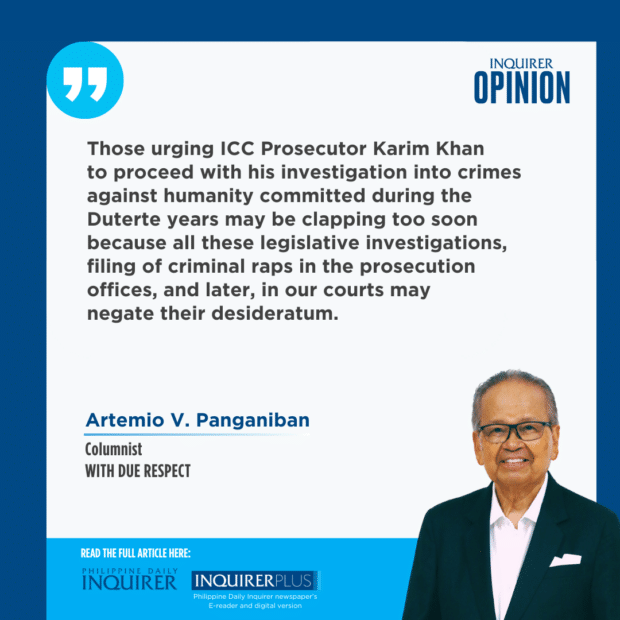Quad comm’s ‘telenovela’ and the ICC

The legislative inquiry on the extrajudicial killings, illegal drugs, and illicit Philippine offshore gaming operators committed allegedly during the presidency of, and by, Rodrigo Duterte being conducted by the House quad committee (quad comm) is attracting more viewers via YouTube and other social media than the current blockbuster telenovela aired on free TV: GMA’s “Pulang Araw” and ABS-CBN’s “Lavender Fields.” (I know. I eagerly watch the two shows over Netflix every evening, except Wednesdays and Thursdays.) The twist and turns of the testimonies and revelations about gruesome murders, incredible police connivance, jarring violence, and kitschy sex are more lurid and shocking than the two top TV series, except that they are real, not fictional.
EVEN NORMALLY TIGHT-LIPPED EXECUTIVE SECRETARY LUCAS BERSAMIN was forced into the fray when, in answer to inquisitive reporters, he said, “The Philippines will not return to the International Criminal Court (ICC) … Based on this, the President is not expected to change his mind and refer the quad comm matters to the ICC.” Lead co-chair Robert “Ace” Barbers chimed in, saying the House super panel has no plans to turn over its records or documents “or anything to the ICC.”
Instead, Solicitor General Menardo I. Guevarra said the quad comm would be well-advised to turn over its findings to the Department of Justice, the National Bureau of Investigation, or the Office of the Ombudsman. His text to me stressed:
Article continues after this advertisement“… on my part, I have consistently stated that the government has no legal duty to cooperate with the ICC investigation, citing that the ICC could no longer exercise jurisdiction over the Philippine situation, since the ICC prosecutor was authorized to commence his investigation only in 2021, or more than two years after the effectivity of our withdrawal from the Rome Statute in March 2019. However … we cannot stop the ICC prosecutor from proceeding with his investigation and interviewing certain individuals by whatever means available to him, provided these individuals consent to be so interviewed. I have not deviated from this position, Chief.”
STUNG BY WHAT HE PERCEIVED AS UNPRECEDENTED BREACHES of interparliamentary courtesy and as malicious innuendos linking him, Sen. Bong Go and the former president to horrible crimes during the quad comm’s inquiry, Sen. Ronald “Bato” dela Rosa blurted that the Senate committee on public order and dangerous drugs that he chairs will hold a parallel investigation. However, Senate President Chiz Escudero said that only the blue ribbon committee can conduct investigations during the Senate break. At all events, Dela Rosa is confident that the former president would attend the Senate committee hearings to defend himself from the false accusations hurled against him during the House telenovela.
On her part, former senator Leila de Lima said her team is preparing a criminal complaint against Dela Rosa for allegedly coercing quad comm resource person Kerwin Espinosa to link her to the illegal drug trade, causing her detention for almost seven years only to be acquitted thereafter.
Article continues after this advertisementThose urging ICC Prosecutor Karim Khan to proceed with his investigation into crimes against humanity committed during the Duterte years may be clapping too soon because all these legislative investigations, filing of criminal raps in the prosecution offices, and later, in our courts may negate their desideratum.
WHY? BECAUSE UNDER THE ROME STATUTE (RS), the international treaty that created the ICC, an individual (like Duterte, Dela Rosa, and Go) may be held liable only (1) for crimes listed in the RS (2) committed in the territory of a member-state, or anywhere by a national of a member-state (3) when such state is or was a member, (4) provided there is no “complementarity,” that is, the ICC will act only if the state is “unwilling or unable genuinely to carry out the investigation or prosecution” (Article 17).
By the quad comm’s referral of its findings to the prosecuting arms of the government, the filing of criminal charges against Duterte, Dela Rosa, et al., and the assumption of jurisdiction by our courts, the conduct of trials and the rendering of judgments thereafter, the ICC can be precluded from taking over these cases, given that our country would not be shown to be unwilling or unable genuinely to prosecute under Article 17 of the RS.
Moreover, under another provision of the RS, the ICC can assume jurisdiction only over cases initiated within two years of a country’s withdrawal from the RS. Duterte, as then president, withdrew the Philippine membership on March 17, 2018. Under the RS also, the withdrawal took effect a year later on March 17, 2019. However, it was only on Sept. 15, 2021, or more than two years thereafter, that the ICC authorized Khan to commence his requested investigation of an alleged “crime against humanity of murder, committed in the Philippines between Nov. 1, 2011 and March 16, 2019.” In view of the foregoing premises, ICC has lost its jurisdiction. (Although to be fair, then ICC prosecutor Fatou Bensouda announced her “preliminary examination … of the Philippine situation” on Feb. 8, 2018. For details, see my Aug. 7, 2023 column).
—————-
Comments to chiefjusticepanganiban@hotmail.com
















